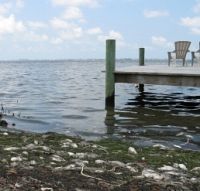

Sir David Attenborough's "Blue Planet II" brought the issue of plastic waste in the seas to a mass audience, and ever since the series aired in late 2017, the issue has been at the forefront of environmental discussions and research. It has even inspired the government to move quickly on potential solutions to reduce single use plastic.
However, while these solutions try to tackle the root cause of the issue to prevent further environmental problems, a scientific breakthrough could potentially address the abundance of plastic currently polluting the environment as well as any plastic bottles produced in the future.
Back in 2016, scientists discovered a natural enzyme produced by a bacteria which seems to consume PET, which is a strong plastic commonly used in bottles and which takes hundreds of years to break down on its own. Scientists now believe they have modified the enzyme so that it can start breaking down these plastics in just a few days. If used in a controlled recycling process, it could revolutionise how plastics are re-used.
The team behind the engineered enzyme at Portsmouth University includes PhD and undergraduate students. And although they have now potentially made an incredible breakthrough in tackling plastic waste, there are still many challenges ahead in figuring out how to practically use this enzyme.
What is clear is, the enzyme could actually result in proper recycling. When we recycle bottles currently, the materials are broken down and re-used in other items, which then often end up in landfill anyway. The enzyme essentially reverses the manufacturing process and returns the polyesters making up the plastics to their original building block, so they can be used from scratch again.
Professor McGeehan, who is involved in the current study of this enzyme, explained: "They could be used to make more plastic and that would avoid using any more oil...Then basically we'd close the loop. We'd actually have proper recycling. There is an urgent need to reduce the amount of plastic that ends up in landfill and the environment, and I think if we can adopt these technologies we actually have a potential solution in the future to doing that."